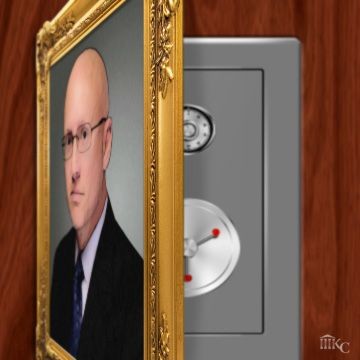The Lawyer's Lawyer
Avoiding Trust
Q. If my clients agree to it in writing, can I avoid the need for a trust account and put their money elsewhere?
A. In theory, this is possible. In practice, if you wish to remain in practice, this may not be the safest approach — for you or for your clients.
In most cases, you must deposit legal fees and expenses that have been paid in advance into a client trust account and may only withdraw those funds as fees are earned or expenses incurred. Though the details vary in different states, you must carefully account for all trust transactions, reconcile them with your bank statement every month to ensure against loss, and maintain client ledgers identifying the balance of funds pertaining to each of your cases.
Those who fail to follow these regulations place more than their clients' funds at risk, and many have lost their licenses over trust violations.
To avoid this danger, it may be tempting to circumvent these regulations by exploiting an exception provided in the Rules of Professional Conduct themselves. If "the client gives informed consent, confirmed in writing, to a different arrangement," Rule 1.15 would let you deposit these funds directly into your operating account instead.
But this isn't as easy as it sounds. To get the client's "informed consent," you must provide "adequate information and explanation about the material risks of and reasonable alternatives to the proposed course of conduct."
At a minimum, your retainer agreement should review the details of this alternative, emphasizing that:
➤ Ordinarily, such funds are deposited into a trust account for safekeeping;
➤ The client may direct that these funds also be placed into a trust account;
➤ Placing these funds into an operating account does not affect a lawyer's duty to refund amounts which have not been earned;
➤ Funds held in an operating account or elsewhere are subject to greater risk, which may make it more difficult to get a refund if something goes wrong; and
➤ The client has the right to consult with other counsel before signing off on such an arrangement.
Unlike a trust account, which is held separately from the attorney's own funds, the liquidity of a regular account depends on the stability of the lawyer that owns it. If the lawyer or law firm were to declare bankruptcy, a bankruptcy trustee may freeze these assets and preclude the lawyer from distributing them. If the lawyer's assets were seized by law enforcement, other creditors or taxing authorities, this may jeopardize the balance of the account. If the lawyer dies before fees are earned, funds within an account bearing that attorney's name will become part of the estate and probate administration.
By contrast, since funds placed in a trust account are held separately from the lawyer's own money, getting them back will not require the approval of bankruptcy trustees, probate courts or others that may later control the lawyer's assets. Even if such calamities do not befall the lawyer, when funds are held in an account used for a lawyer's personal or business expenses, they are more likely to be misused.
If you were the client, would you sign an agreement to place your funds in greater jeopardy? In most cases, it's hard to see how clients would benefit from such arrangements.
Some situations may require alternatives. For example, in many federal circuits, attorneys preparing Chapter 7 bankruptcy petitions can't get paid after filing them. The Bankruptcy Code bars the collection of pre-petition debts during the pendency of cases designed to discharge them. Rather than violate this law by taking the debtor's funds from the trust account thereafter, bankruptcy lawyers often prefer to take them into their operating accounts before these cases are filed.
Where special circumstances are lacking, lawyers who rarely take retainers and have little use for a trust account may still wish to have their clients' consent to a similar arrangement. But a desire to avoid the duty of trust accounting won't justify a departure from practices designed to protect their funds.
In short, we may not reduce our professional risk by increasing our clients' financial risk. If you're the only person who would benefit from a proposal that places client funds at greater risk, you should expect disciplinary boards and courts to question the validity of your client's consent. Absent a special need for such arrangements, they often find the level of "informed consent" to be lacking. Under a judicial microscope, it's easy to find fault with the language of the agreement or the details disclosed. If the client was not sufficiently "informed" about the risks of such arrangements, lawyers seeking to circumvent trust account rules may be sanctioned for violating them.
For this reason, I wouldn't put too much stock in rules allowing for "informed consent." When lawyers place client funds at greater risk, they place their licenses at risk as well.
